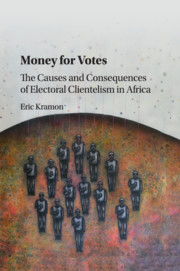2 - Electoral Clientelism in Kenya
from Part I - The Puzzle of Electoral Clientelism
Published online by Cambridge University Press: 26 October 2017
Summary
This chapter serves two purposes. First, I introduce the Kenyan case. Second, I address a number of descriptive, but difficult to answer, questions about electoral clientelism in Kenya. Indeed the anecdotal evidence suggests that electoral clientelism is widespread in the country. However, important descriptive questions about electoral clientelism remain unanswered. How much electoral clientelism is there really? How much does it cost? Does electoral clientelism impact how people vote? Answers to these descriptive questions provide a crucial starting point for an analysis of electoral clientelism's causes and consequences.
I analyze original nationally representative survey data about electoral clientelism during Kenya's 2007 elections. To address the challenge of response bias, I implement a survey list experiment. As I detail below, survey list experiments provide an indirect method for eliciting less biased responses to sensitive survey questions. I complement the main survey findings with descriptive data from two sources: an in-depth survey I conducted in Kenya's Nairobi and Rift Valley Provinces; and data from an unusually rich campaign finance survey conducted with candidates for parliament in 2007.
The quantitative results confirm that electoral clientelism is widespread and expensive. About 20 percent of those I surveyed received a cash handout during Kenya's 2007 campaign. These handouts range in value from 1 to 20 US dollars. For political candidates, electoral clientelism is costly: the average candidate for parliament spent about 3 million Kenya shillings on electoral clientelism (about 48,000 US dollars), a substantial amount in a country where the GDP per capita is about 900 US dollars per year. This investment is by far the biggest campaign expenditure item, tripling the amount that candidates spend on campaign rallies, travel, and campaign materials. Results from the survey list experiment show, importantly, that electoral clientelism influenced the vote choice of about 20 percent of Kenyans in 2007.
KENYA BACKGROUND
Kenya is located in East Africa. With its eastern border along the Indian Ocean coastline, the country's neighbors include Tanzania to the south, Uganda to the west, and Sudan and Somalia to the north. As of 2014–2015, Kenya's GDP per capita was about 1,350 US dollars and the population was about 46 million.
- Type
- Chapter
- Information
- Money for VotesThe Causes and Consequences of Electoral Clientelism in Africa, pp. 32 - 46Publisher: Cambridge University PressPrint publication year: 2017



